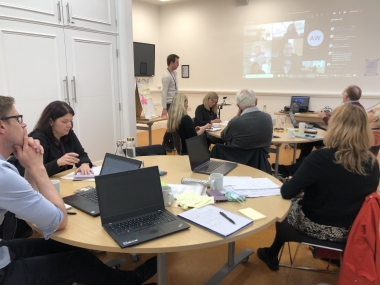Hybrid working – Manchester approach for the co-creation of its’ draft IAP
Edited on
26 January 2022The focus of Zero Carbon Cities (ZCC) is to help cities transition to carbon neutrality in line with science-based targets required in order to align with the Paris Agreement. Manchester is the Lead Partner for the network along with Bistrita, Modena, Tartu, Vilvoorde and Zadar.
To support this aim, each network city will produce an Integrated Action Plan (IAP) setting out how it will implement actions to support the ambition. The plan is an output of the city’s local stakeholder group (ULG – Urbact Local Group) and should be a co-creation of the city and the ULG.
Working collaboratively has been a challenge for city partners due to covid restrictions. The Manchester team held a planning session to look at how it might engage its stakeholders in the production of the IAP. It considered what stakeholders should be targeted (key and others) and what method of engagement would be most effective and provide most value. As covid rules started to relax in the UK, Manchester resolved to organise a workshop to develop the city’s draft Integrated Action Plan. It was clear that not all stakeholders would be able to meet physically so the project team determined that a hybrid workshop be created involving both physical and virtual participants.

The workshop took place in the Autumn of 2021 at a location in the city centre. The venue was selected on the basis that it had the technical provision for this model of working and was attended by representatives from the city council, including the zero carbon team, the Manchester Climate Change Agency (the city’s ULG co-ordinator), experts on carbon budgeting from Manchester University (Tyndall Centre) and Anthesis, and the ZCC Lead Expert from EnergyCities.
The Workshop focused on a range of topics and looked at how these had developed since the project began, what had been achieved in the last two years, and what was planned next. There were small breakout groups which considered a series of questions covering the following topics:
- Urbact Local Group - How can we strengthen the local stakeholder group to help with the delivery of the IAP and Framework actions to reduce emissions?
- Science-based targets and carbon budgeting (our methodology and targets) - What do we need to do to improve, communicate and implement our targets? and, What have we learned from ZCC and how will we use this in our IAP development and Framework refresh?
- MCC zero carbon coordination group (the municipality stakeholder group) - How can we bring additional capacity and expertise in to support the municipality climate action plan? and, What do we need to do to align this with the wider climate change Framework refresh (being done as part of ZCC)?
- Community engagement - How do we engage politicians and policy makers to engage with the call to action from Citizens?
There were some important contributions from the discussion which form part of the IAP. For example, working with existing partners to act as a connector and enabler for wider engagement on action. The discussions also helped to identify some of the challenges and barriers for stakeholders to act.
This Hybrid workshop was a new approach to collaborative working during the covid pandemic but it worked really well. The workshop took place whilst social distancing rules were in place so there were number restrictions in the venue and we had to ensure that we followed all covid rules.
The workshop was the first opportunity for the project team and stakeholders to meet physically and there was a lot of benefit in being able to talk collectively rather than taking turns on screen which was evidenced by the quality of the discussion conclusions. It was a really important event for engaging with our ULG stakeholders and reigniting their interest and commitment to the project.
A draft IAP has been produced by Manchester which will be finalised for use locally.
Submitted by Laura McIntosh on
